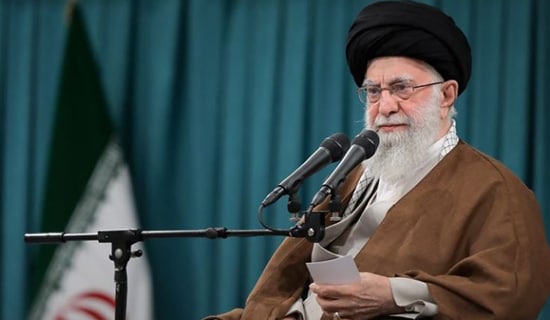The director of the Association for the Defense of Journalism in Iran, Dr. Mohsen Kedivar, participated in a seminar titled "Towards Democracy" at the Law and Political Science Faculty of the University of Tehran. In a speech, he addressed the issue of tyranny and democracy in Iran, noting that Iranian society had experienced two types of tyranny: secular tyranny under the Shah's regime, and religious tyranny under the regime of the Islamic Revolution.
According to Kedivar, there are two perceptions in Islam. One is a totalitarian perception that maintains that Islam contradicts democracy. The adherents of this perception see the establishment of a religious regime and repression of the people as legitimate. The second perception maintains that Islam promotes freedom and does not contradict democracy.
It should be emphasized that Kedivar, who is a cleric and a prominent intellectual of the reformist stream, does not rule out a religious regime; he only fears that religious tyranny might take over the running of day-to-day affairs, which will bring religious totalitarianism.
Kedivar states that Islam is a religion related to time and location, and that it is the people who must decide how society should be run. He sees democracy as the best way of managing society's affairs, but does not preach secularism, and even opposes secularists who call for separation of religion and state. He has in the past been tried and imprisoned for his writings. The following are excerpts from his speech at the seminar: [1]
Both the 'Constitutional Revolution' and the 'Islamic Revolution' Have Failed to Solve Tyranny'
"Since the Constitutional Revolution in Iran, we [Iranians] have had experience with two forms of tyranny, secular and religious. [2] Like the Constitutional Revolution, the Islamic Revolution has failed to solve the problems of tyranny in Iran. The most controversial [political and social] discussions in the past century have erupted between the followers of two different schools of thought and the followers of two different interpretations of Islam.
"According to one interpretation, the social affairs of a country are entrusted to one man, while according to the other, trust is placed in the people and its freedom is respected [i.e. 'Islamic democracy']… The two interpretations have advocates, both among the intellectuals and among the clerics.
"In Iran we have experienced both secular tyranny, based on a fascist interpretation of politics and sociology, and religious tyranny, based on a fascist interpretation of faith. Religious tyranny is undoubtedly the more dangerous, since it uses religion as a means of applying political pressure on the people.
"Both religious tyranny and secular tyranny took shape in Iran after the Constitutional Revolution, and advocates of both strived to ensure their hegemony and political power in Iranian society… Over the past 25 years we have witnessed [these] two interpretations of Islam in Iran. One impeded the Iranian nation's efforts to create a democracy, whereas the other tried to help efforts to promote freedom."
'The Problem in Religious Rule is the Fascist Interpretation that Leads to Totalitarianism'
Kedivar noted that the two interpretations of Islam have always co-existed: "The first is totalitarian and the second emphasizes [the religious support] freedom and democracy. Those who advocate the first [totalitarian] interpretation believe that the only way for religion to attain power is through political rule… This is the populist approach to democracy, and in other words … tyranny. Authority, according to this interpretation, is not derived from the public, but from Heaven, and it appears in its most lucid form in the ideology of the religious government…"
Kedivar stressed: "Political Islam [in and of itself] has never presented a problem [because the people are religious]. [The problem lies in] the fascist interpretation of political Islam: [the problem lies in] the belief of a specific group of people [i.e. the clerics in power] that they enjoy special rights and [the problem lies in the claim that Islam is a system of] fixed rules and regulations that are unchangeable.
"[There are] two groups which do not support freedom or democracy: [The first group is] those who support the totalitarian interpretation of religion and Islam, and [the second group is] the secular Iranians and foreigners who equate Islam with totalitarianism… The secular view religion as matter for the individual. When the officials of the regime are religious and advocate religious rule, they are permitted to propose [religious rule to the public] as a public matter, but even then [the endorsement of this principle should] be dependent upon its acceptance by the majority…"
Islam Promotes Freedom and Democracy
"[The adherents of the second interpretation, i.e.] democratic Islam, view religion as based upon democratic principles… Islam, [in their opinion,] is – for most – a way of life related to time and place… According to the first interpretation [i.e., the totalitarian interpretation of Islam], Islam is contradictory to democracy and impedes it. But according to the second interpretation, not only is [Islam] not contradictory to democracy, but it is even considered a catalyst in its [implementation].
"In our society, democracy is an [essential] need but it [in itself] is not sufficient… [The Islamic public] does not need to denounce democracy merely because it comes from the West. Democracy is the best method of governing, because it reduces to a minimum the role of the individual and replaces it with the rule of society by public wisdom. The establishment of a democratic order must be based on four main principles: free and fair elections, the establishment of a civil society, respect for human rights, and transparency of governmental actions.
"It is incumbent upon Muslims to reevaluate the existing religious traditions and to reform religious and democratic [values]. They must accept the fact that democracy is the only way to run the social and political affairs [of society]."








